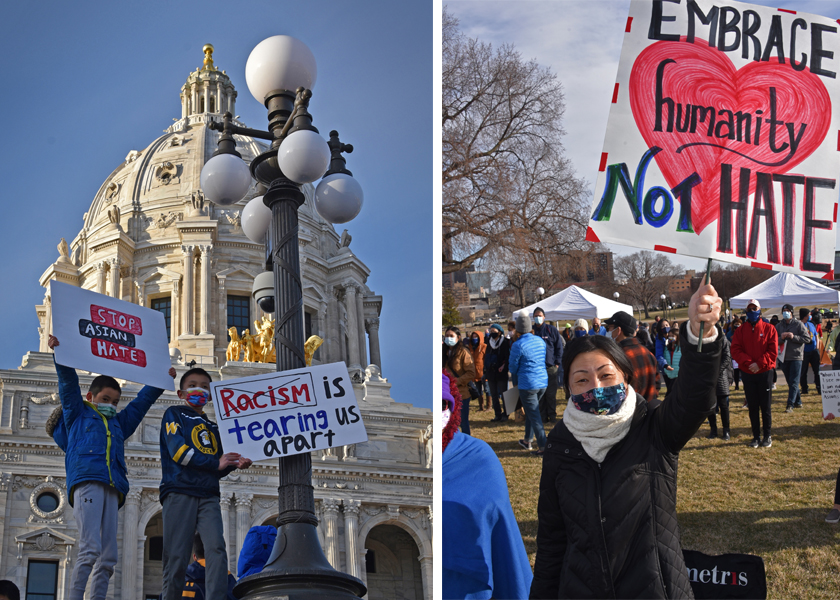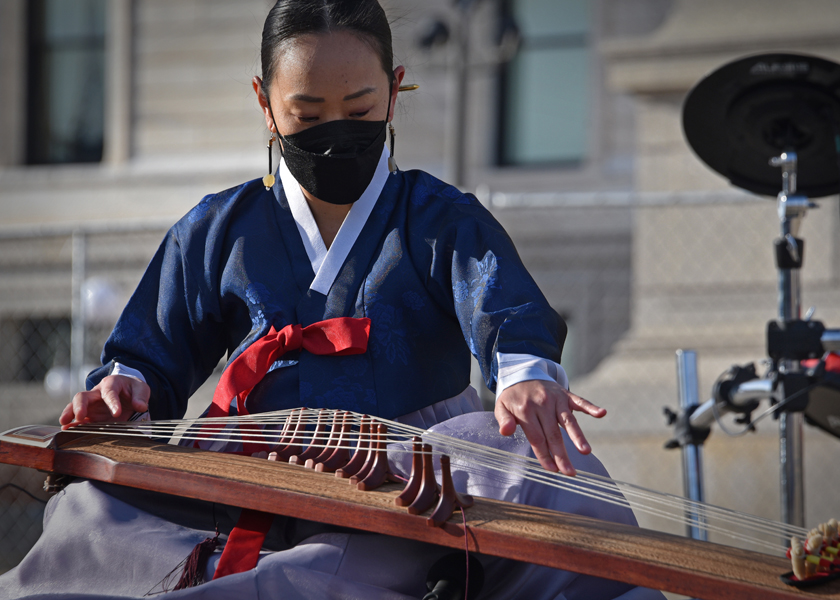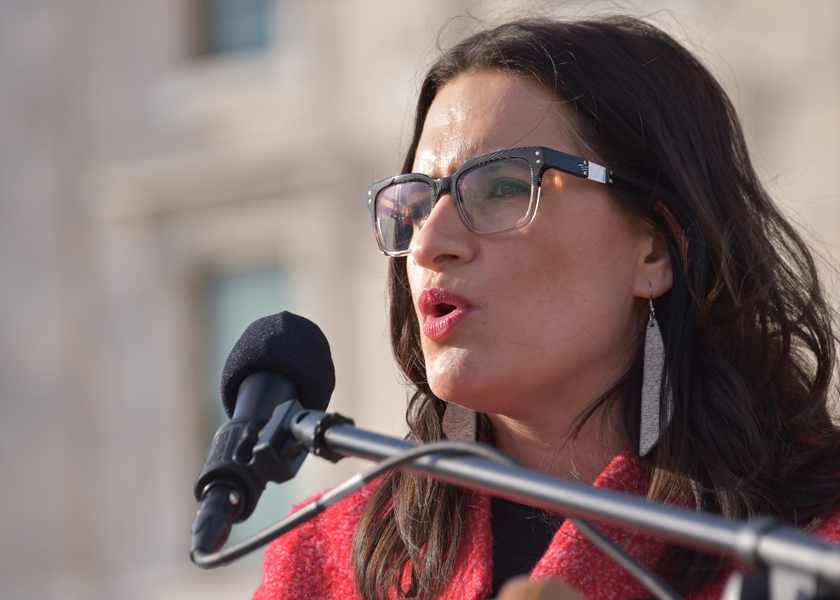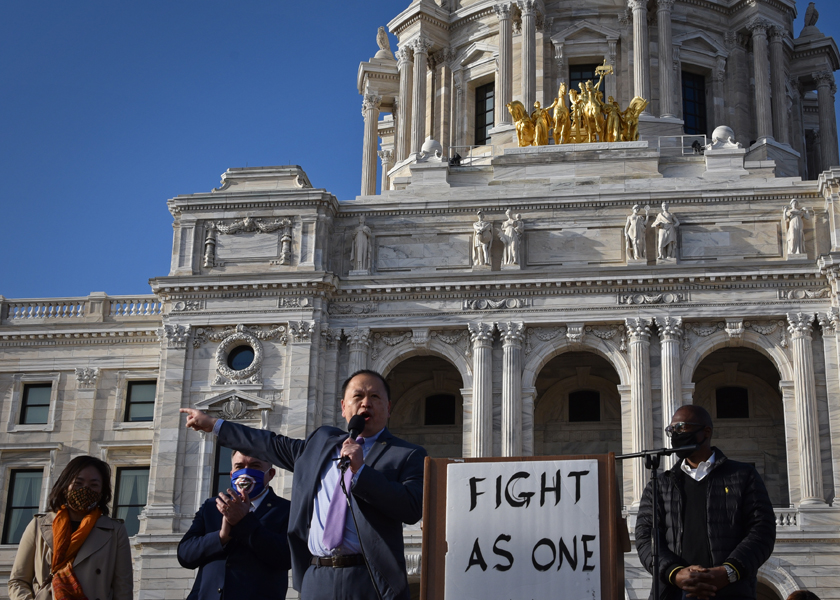Asian Minnesotans march against oppression and lobby for new hate crime laws | By Martha Vickery (Spring 2021 issue)

In the weeks following the mass murder of eight people, including four Korean American women, in Atlanta, Twin Cities Asian Americans got together in a series of virtual and in-person events to express pain, speak out against anti-Asian hate, and express solidarity of the diversity of people who are Asian Minnesotans.
The best-attended event was the rally at the Capitol on Sunday March 28, which attracted the attention of state elected officials and was co-sponsored by more than 20 community groups.
“We will not ‘Minnesota Nice’ our way through this crisis,” said Lt. Governor Peggy Flannagan at the start of the rally.
The many speakers at the events, held in March and early April, were from some of the many Minnesota Asian immigrant communities associated with traumatic histories as war refugees.

The event also included musical performances, poetry, speeches by community activists and elders, and a candlelight procession to honor the Atlanta victims. Two Korean Americans performed: Eva Song Margolis played gayageum (a Korean traditional stringed instrument) during the rally; and musician Jinsoo Kim sang a traditional Korean song for the candlelight ceremony. The Korean traditional performing arts organization Jangmi Arts also sponsored and assisted in a craft project so that participants could make their own lotus lantern for the candlelight procession.
In addition to a direct response to the Atlanta shootings, the events were also to respond to increased racial violence against Asian Americans over the past year. The rise in hate incidents was exacerbated by Trump’s racist stance, his blaming of China and referring to the coronavirus as “the China virus.”
The national advocacy group Stop AAPI Hate documented more than 3,800 hate crimes and hate incidents against Asian Americans over the past year, although due to underreporting the actual number could be much higher.
Asian Minnesotans described their own experiences with hate in several virtual sessions, including one on March 24 by the coalition Asian Minnesotan Alliance for Justice, with more than 800 in attendance, designed to discuss community unity against hate crime. The pending anti-hate crime legislation would make reporting and collecting data about hate crime easier in Minnesota.

The rally Sunday March 28 attracted several elected officials who wanted to talk about their support of the hate crime legislation. Lt. Governor Peggy Flannagan, a Native American from the White Earth Band of Ojibwe, said the gathering was important “to show that we are all relatives and we have to stand up for one another.” She emphasized that the Walz administration is “committed to ensuring that everyone is safe and that our administration is providing resources and space for the AAPI community to be seen and heard, and valued and protected.”
In the wake of senseless violence, there is a feeling of helplessness, Flannagan said, but “We are not helpless. We are not hopeless. We can take action.” Flannagan mentioned the in-process hate crimes legislation (HF1691, SF2003) that would provide police officer training in recognizing hate crimes and dealing with victims, and also with allowing community organizations to take hate crime complaints from victims and route them to law enforcement for prosecution, since victims are often reluctant to report hate incidents directly to law enforcement.
At the time of the demonstration, the hate crimes bill had been passed by the House Judiciary Committee and was pending in the Senate Judiciary Committee, Flannagan said. “And Minnesota Republicans, it is your turn to take up this legislation. To get it done. We cannot wait.”

Senator Foung Hawj (D-District 67) told a story from 30 years ago about Lake Phalen Park, which is frequented by Asian Americans who live on the East Side. He said that back then, “when one Asian showed up at the lake, they told him to go home. When two Asians showed up, they had to say it twice. And when three Asians showed up, they had to say it three times, and when 1,000 Asians showed up, that person left town.” Asian hate is nothing new, Hawj said, “but stand your ground, and at that same time offer love.”
Hawj, a co-author of the hate crimes bill, introduced Sen. Bobby Jo Champion (N. Minneapolis), Sen. John Hoffman (Brooklyn Park, Champlin and Coon Rapids) and Speaker of the House Melissa Hortman.
Rep. Rena Moran, who represents a large demographic of Asian Americans in the Frogtown and Midway areas, prefaced her remarks by saying she is the great-granddaughter of slaves, said the issue of racial hate “is personal for me, and it’s personal for my community,” and thanked the participants on the Capitol Mall, adding that “love will prevail.”
Chen Zhou from the Chinese Community Center (U.S.-China People’s Friendship Association – Minnesota Chapter) said his daughter recently told him that she was called a “chink” on the way home from school. She was shocked and angered. A Hmong friend got beaten up “because they thought he was the cause of the so-called China virus. He was born and raised in Minnesota. He’s never been to China, but that does not matter. They took their frustration and fear out on him.”
Zhou expressed his shock at the many attacks across the nation on elders; a Thai elderly man who was pushed down in an attack in San Francisco and later died, an 83-year-old Vietnamese man was attacked in a farmer’s market, and a 75-year-old woman who was punched in the face. “What would you do if your grandmother got punched in the face? What would you do if your father got attacked in the farmer’s market? What would you do if your grandfather got pushed and killed on the street?” he asked the audience spread across the Capitol lawn. “Would you tolerate that? Would you ask for justice? Would you stand up and demand a better America?”
Just when we thought that was the worst, Zhou said, Atlanta happened. The eight people killed “died too young, and they deserve better.”
In Chinese, Zhou said, the word for “Asian American” ironically sounds like the “silent race.” “We Asian Americans have been silent for too long. Now it is time to speak up,” he said. “America needs to listen to us. We are not the cause of the virus. We are not your punching bags. Our women are not somebody’s fantasy. Our grandparents should not be pushed and left to die on the streets. We should not be terrorized and killed when somebody is having a bad day.”
Zhou called on the demonstrators to help stop violence and Asian hate. “We will listen to each other, love each other and work together. For that is what makes America beautiful. That it is the land of the free and the home of the brave. And we need to be brave.”
Zhou ended by reading a quote from Dr. Martin Luther King, that “‘Racism anywhere threatens freedom everywhere.’ We are all Americans. This is our country. It belongs to all of us.”


